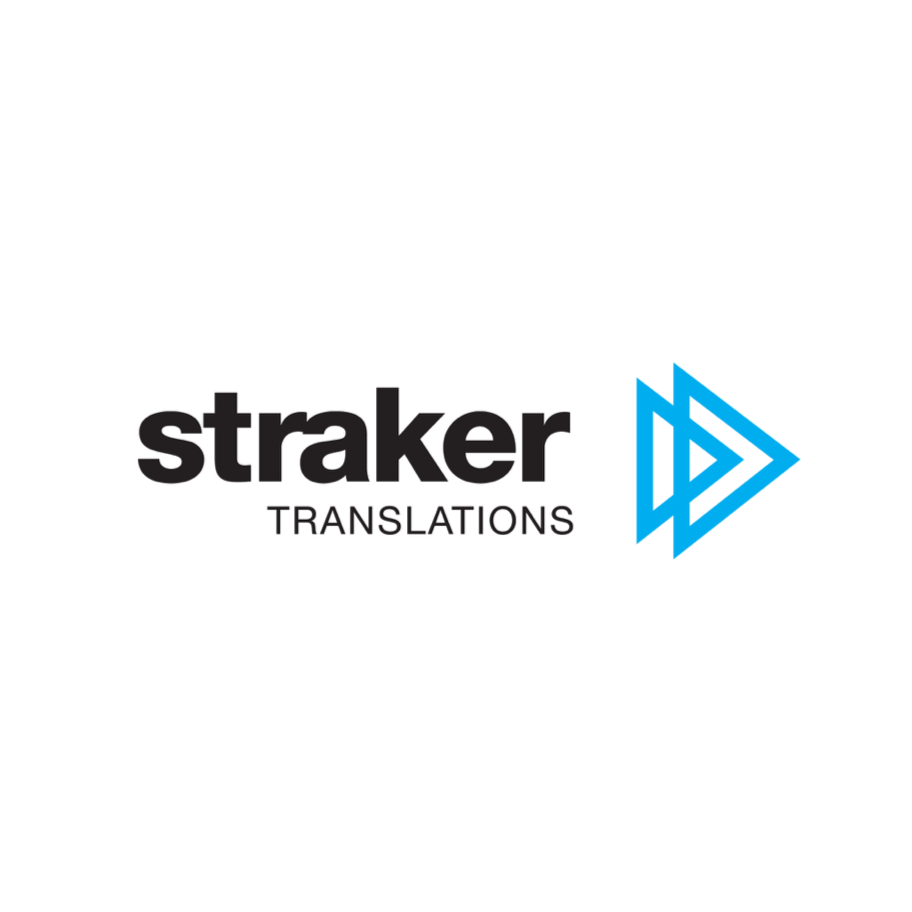
NZ Herald: TIN report reveals NZ’s largest and fastest-growing tech exporters
The 2022 financial year was tough on some sectors, amid the lingering pandemic and supply chain issues, but our largest high-tech exporters had a ripper.
The latest TIN (Technology Investment Network) Report says our 200 largest tech companies (the TIN200) saw their total revenue increase 9 per cent from $13.9 billion in 2021 to $15.1b for the 12 months to March 31, 2022.
Their combined export receipts were up 9.1 per cent to $11.5b.
Their combined employee count increased by 10.9 per cent to 62,718.
And a record $190m in venture capital was invested in early-stage firms.
“It’s the second solid year that tech has been our number two source of offshore revenue [behind dairy] and it shows the potential to become number one because of its fast growth, and diversity of markets,” says TIN managing director Greg Shanahan (although there is the proviso that TIN takes a different definition of the sector from Statistics NZ; more on which below).
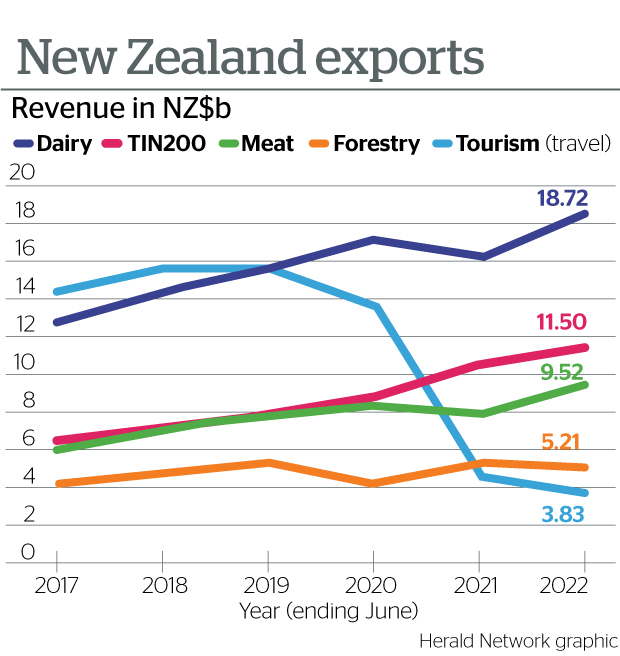
In the US, the centre of the high-tech universe, multiple firms have cut back or frozen hiring, or begun mass layoffs, while venture capital has suddenly dried up.
And there are signs that the venture capital boom is over here, though it seems much more like a cooling off than the big freeze that’s hit America. Blackbird Ventures - the largest Australasian VC firm - recently said it had raised $75m for its second NZ fund, behind its early publicly stated target of “at least $80m” and cap of $100m.
A spokeswoman for Blackbird said the fund would remain open until “early 2023″ and that “we’re confident we’ll hit $80m”).
Elevate, the VC fund created the Crown-backed NZ Growth Capital Partners in 2020 to ginger the local venture capital scene has now invested nearly all of the $270m it rhttps://media.nzherald.co.nz/webcontent/infographics/7071/181122HIGHLIGHTS.jpgeceived from the Super Fund and it’s unclear at this point if it’ll get a top-up,
Shanahan is picking that TIN200 firms will prove resilient in the current financial year.
He says US-based firms culling staff could help NZ-based techs, who are short of some 3000 roles.
And he says the diversity of our high-tech sector, which spans from the likes of Fisher & Paykel Healthcare, which has benefited from pandemic demand to agritech to the likes of “software-as-software” firms like Xero and Pushpay that have prospered from the way Covid has accelerated adoption of cloud computing to computer gaming and fintech, positions it better than other, narrower sectors.
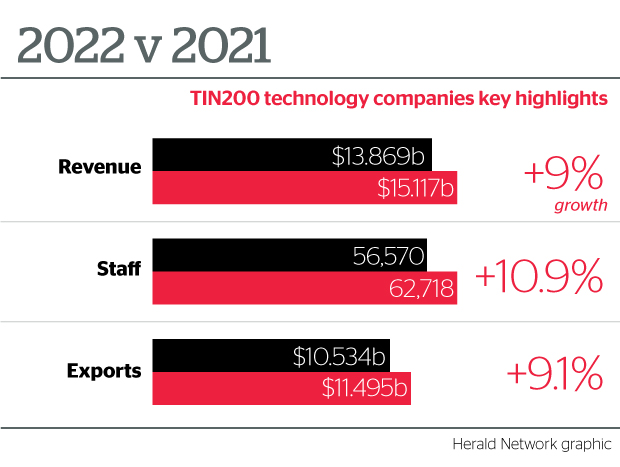
And while NZ’s exports overall remain heavily dependent on China, TIN200 companies saw a broad geographic spread with 26.8 per cent of their revenue from Australia, 23.1 per cent from North America, 12.8 per cent from Europe, 7 per cent from Asia, 1.5 per cent from Latin America and 4.9 per cent from the rest of the world (with the balance generated domestically).
Again, Shanahan sees this diversity as better positioning the high-tech sector for growth, and wearing ups and downs in the global economy.
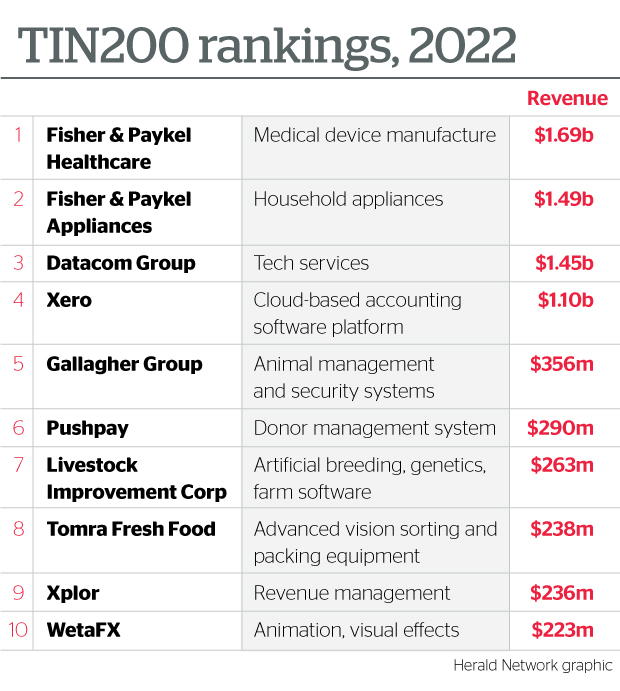
The big dogs
TIN’s top 10 was pretty static. In fact, there was only one change over 2021, with Fisher & Paykel Appliances moving up one place to 2 as it nudged ahead of Datacom Group, the IT services firm owned 55 per cent by Holdsworth family vehicle Evander Management and 45 per cent by the NZ Super Fund.
Elsewhere in the top 10, ASX-listed Xero and ASX/NZX-listed Pushpay again flew the flag for NZ-founded firms selling software worldwide via the cloud.
Ag-tech was represented by the cooperatively-owned Livestock Improvement Corporation, Gallagher Group (still owned by the Gallagher family), Tomra (the old Compac, now owned by Norwegians), with abattoir and industrial automation firm Scott Technology (bought by Brazil’s JBS in 2016) just outside the top 10.
Fin-tech is represented by Xplor, created last year by the merger of Auckland rich lister Murray Bolton’s Transaction Services Group with US payment services firm Clearent.
The fastest-rising stars
RocketWerkz, the Dunedin-founded, Auckland-based gaming studio majority owned by founder Dean Hall (with Chinese giant Tencent holding a minority stake), was the biggest gainer.
Hall’s firm lept 32 places to 90 on this year’s TIN200 on the back of its global hit online multiplayer game Icarus. The success came even as its founder fumed against NZ’s immigration policies and our Government’s failure to match a tax breaks introduced mid-year for game developers across the Tasman.
The second biggest gainer was Straker Translations, which jumped from 83rd to 51st spot as its revenue increased 78 per cent $55.9m as the Auckland-based, ASX-listed firm raised funds buy rivals during what’s become Tech Wreck 2.0. Earlier co-founder and CEO Grant Straker told the Herald that being part of Prime Minister Jacinda Ardern’s May trade mission to the US had helped: “Many of us have had our moments on domestic policy. But without a doubt, she is a superstar overseas. She’s well-connected to world business leaders and that is very good for NZ businesses with the doors she can open.”
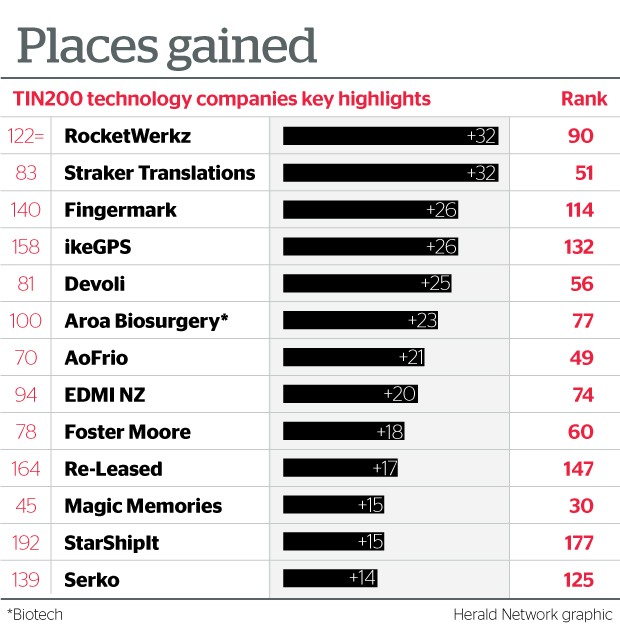
And Fingermark, a Hawkes Bay company that makes software for kiosks and other systems for multinationals like McDonald’s and KFC, was the third-biggest gainer, leaping 26 places to 114th.
A second Hawkes Bay firm - property management software startup Re-Leased, which recently raised $23m in a round led by London-based real estate multinational Jones Lang LaSalle (JLL).
The biggest gainers list wasn’t all relative newcomers. Travel software maker Serko climbed 14 places as its revenue, which fell off a cliff in 2020, started to recover as borders re-opened. The Auckland firm - cash-rich thanks to an anchor investment from the multinational Booking.com - used the Covid lull to hire more staff and develop new online booking products as rivals were pulling back. It finished FY2022 with a wider loss, but with its net cash increasing from the year-ago $79m to $124.5m.
You say tomato, I say ICT, high-tech manufacturing and biotech
Collectively, the TIN200 companies now generate some $11.5 billion in export receipts.
That puts these tech starts at number two in TIN’s chart of New Zealand Exports 2022 - behind dairy, but ahead of meat, forestry and tourism (which of course took a dive during the pandemic).
Here, there’s always a bit of tension, because TIN uses Statistics NZ data for other sectors, but uses its own definition, and total, for high-tech exports - which is way above Stats NZ’s closest analogue - the $1.5b it reported for “Telecommunications, computer, and information services” in the year to December 31, 2022.
To qualify for the TIN 200, a company must originate in NZ, “retain a meaningful presence in NZ”, operate in high-tech manufacturing, biotech or ICT export receipts, and generate at least 10 per cent of its revenue offshore.
That definition means some of the major tech employers in NZ are excluded, including Spark, 2degrees, Vodafone NZ, Chorus and the local operations of Microsoft, HP, AWS and other Big Tech multinationals.
And that at the same time, a form like Fisher & Paykel Appliances - now owned by China’s Haier, with three-quarters of its staff offshore and all of its manufacturing in China, Italy, the US and Mexico.
And that Weta Digital, whose tech division was sold to US software company Unity in November last year in a $2.3b deal, stays in the TIN top 10.
There’s no reason that Pushpay - now with most of its staff and nearly all its business in the US, and on the cusp of being bought by Americans and Australians - couldn’t stay in the top 10 either.
